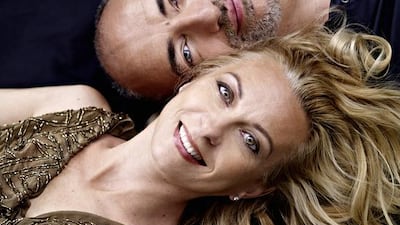Natalie Dessay possesses one of the most recognisable faces – and voices – in opera. Or, rather, she did: after two decades performing everything from Mozart to Strauss and Donizeti to Stravinsky, in the world’s most glamorous concert halls, the 50-year-old French star retired from opera two years ago. What does she miss? Not a thing.
“For me, [opera] was like a golden cage,” she says sternly. “After a while I really wanted to escape, to express myself in a different way.”
Rather than sitting back and writing a memoir, Dessay has been busy during the past two years. First there was a well-received album alongside French composer and pianist Michel Legrand, Entre Elle et Lui. Then she returned to the stage, sans musique, to perform English playwright Howard Barker's one-woman monologue, Und.
“I was planning to stop opera and have time to learn Russian, which is my big goal for next year,” she says. “But actually it seems I have to do so many things before that.”
Those things include performing alongside her husband, the bass-baritone Laurent Naouri, for the first time. It is this partnership that will open next year’s Abu Dhabi Festival and, in keeping with the festival’s “Country of Honour”, their programme, accompanied by pianist Maciej Pikulski will be entirely in French. Was there any conflict when sifting through the Fauré, Duparc or Delibes?
“We argue about children, and education,” she says, “but about music, never.”
Such short shrift has invariably led critics to describe Dessay as a “maverick” or “diva” – or both. But labels and judgements are the last thing she worries about.
“I don’t care in general what people think about what I do,” she says. “I do it for myself first. I’m the hero of my own life. So I decide for myself.”
Such a combination of attitude and acclaim has made Dessay a Parisian célébrité. In the aftermath of last month's terrorist attacks, she was called on to perform a public tribute, offering a spine-tingling performance of chanson singer Barbara's Perlimpinpin. It's not a piece we can expect her to sing again.
“From now on, maybe this song will stay for me forever in this moment,” she says.
Shortly after returning from her Middle Eastern debut, Dessay will make another about-turn. In April she will star in a Parisian production of American composer Stephen Sondheim's musical melodrama Passion. One gets the feeling that won't be the last surprise up Dessay's sleeve.
“My only regret in life is not to have learnt Russian when I was a teenager, when I could have done it,” she says. “I intend to live at least 30 more years and that leaves some time to do some very interesting things.
“No, I don’t want to retire. I will retire when I’m dead, I think that will be enough.”
• Natalie Dessay and Laurent Naouri perform at Emirates Palace on April 10. For ticket details, visit www.admaf.org
rgarratt@thenational.ae

